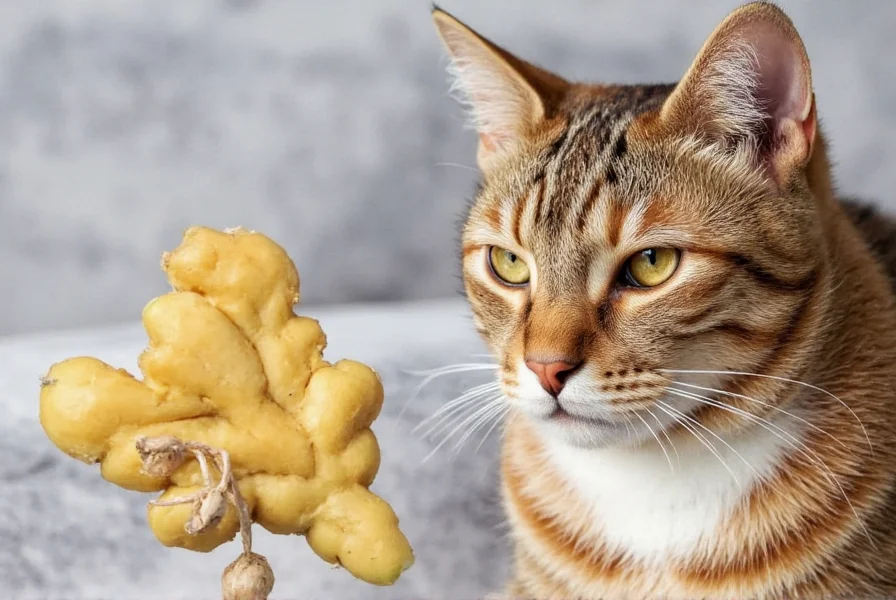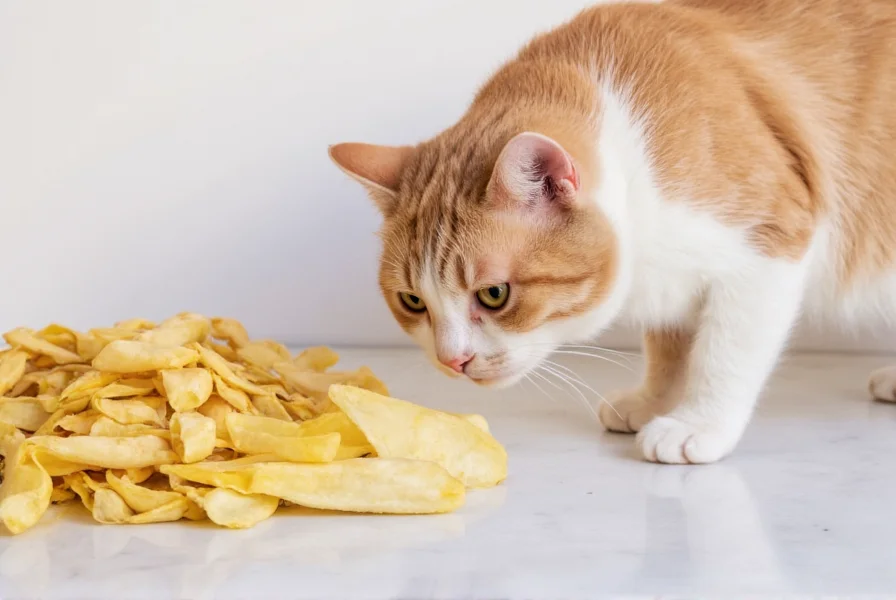No, cats should not eat ginger. While small amounts of ginger are generally not immediately toxic to cats, this spice can cause significant digestive upset and other health complications in felines. Ginger contains compounds that cats' digestive systems aren't designed to process, potentially leading to vomiting, diarrhea, and abdominal pain. Veterinary experts strongly advise against intentionally feeding ginger to cats, as the risks outweigh any potential benefits.
As a cat owner, you might be wondering whether that piece of ginger your feline friend snatched from the counter could cause harm. Understanding the relationship between cats and ginger requires examining both the potential risks and limited benefits of this common kitchen spice.
Why Ginger Poses Risks for Cats
Cats have a highly specialized digestive system that differs significantly from humans. While ginger offers numerous health benefits for people, these same properties can disrupt feline physiology. The primary concern with ginger for cats stems from its active compounds, particularly gingerols and shogaols, which can irritate a cat's sensitive gastrointestinal tract.
Unlike humans, cats lack certain digestive enzymes needed to properly break down plant compounds like those found in ginger. This biological limitation means even small amounts of ginger can cause:
- Severe stomach upset
- Prolonged vomiting
- Diarrhea
- Loss of appetite
- Dehydration from gastrointestinal distress
Ginger Toxicity Levels in Cats
While ginger isn't classified as highly toxic to cats like some other human foods (such as chocolate or onions), it still presents significant health risks. The table below outlines potential effects based on consumption levels:
| Amount Consumed | Expected Symptoms | Recommended Action |
|---|---|---|
| Small taste (less than 1/4 tsp) | Mild stomach upset, occasional vomiting | Monitor for 24 hours, provide fresh water |
| Moderate amount (1/4-1/2 tsp) | Frequent vomiting, diarrhea, lethargy | Contact veterinarian for advice |
| Large amount (1/2 tsp or more) | Severe vomiting, bloody stool, dehydration | Seek immediate veterinary care |
Can Cats Eat Ginger for Nausea or Digestive Issues?
Some pet owners wonder if ginger's anti-nausea properties in humans might help cats with digestive problems. While ginger does have antiemetic effects in people, using ginger for cats with nausea is not recommended. The potential for causing additional gastrointestinal irritation outweighs any possible benefits.
Veterinary professionals emphasize that cats experiencing nausea or digestive issues require species-appropriate treatments. Administering human remedies like ginger can worsen the condition and delay proper veterinary care. If your cat shows signs of nausea, consult your veterinarian for appropriate treatment options specifically formulated for felines.
What to Do If Your Cat Ate Ginger
If your cat has consumed ginger, follow these steps:
- Assess the amount: Try to determine how much ginger your cat ingested
- Monitor symptoms: Watch for vomiting, diarrhea, or unusual behavior
- Provide water: Ensure fresh water is available to prevent dehydration
- Contact your vet: Call your veterinarian, especially if symptoms develop or if a significant amount was consumed
- Do not induce vomiting: Unless specifically instructed by a veterinarian
Safer Alternatives to Ginger for Cats
If you're considering ginger for specific health concerns, safer alternatives exist:
- For digestive issues: Veterinary-prescribed probiotics specifically formulated for cats
- For nausea: Medications approved by your veterinarian
- For general wellness: High-quality commercial cat food meeting AAFCO standards
Always consult with your veterinarian before introducing any new substance to your cat's diet, even natural remedies that seem harmless.
Understanding Cats' Dietary Needs
Cats are obligate carnivores, meaning their bodies are designed to thrive on meat-based diets. Their nutritional requirements differ significantly from humans and even from other pets like dogs. Introducing plant-based substances like ginger disrupts their specialized digestive processes.
When considering is ginger safe for cats or any other human food, remember that cats lack the biological machinery to process many compounds found in human foods. What might be beneficial for you could be harmful to your feline companion.
When to Seek Veterinary Care
Contact your veterinarian immediately if your cat shows any of these symptoms after consuming ginger:
- Continuous vomiting (more than 2-3 episodes)
- Blood in vomit or stool
- Signs of abdominal pain (hunched posture, reluctance to move)
- Excessive lethargy or weakness
- Refusal to eat for more than 24 hours
Early intervention can prevent complications and ensure your cat receives appropriate treatment.
Preventing Ginger Exposure
To keep your cat safe from ginger and other potentially harmful substances:
- Store spices securely in closed cabinets
- Be cautious when cooking with ginger
- Avoid sharing human food containing ginger
- Keep ginger-containing products (like teas or supplements) out of reach

Final Guidance on Cats and Ginger
The question can cats have ginger root has a clear answer: it's best avoided entirely. While small accidental exposures might not cause severe issues in all cases, there's no nutritional benefit to ginger for cats, and the potential for digestive upset makes it an unnecessary risk.
Your veterinarian remains the best resource for addressing any health concerns about your cat. They can provide evidence-based recommendations tailored to your feline's specific needs, rather than relying on human remedies that may do more harm than good.
Frequently Asked Questions
Can cats eat ginger in small amounts?
While very small amounts of ginger might not cause immediate severe reactions in some cats, even minimal exposure can lead to digestive upset. Veterinary experts recommend avoiding ginger entirely as there are no proven benefits for cats that outweigh the risks of gastrointestinal irritation.
What are the symptoms if my cat ate ginger?
Symptoms of ginger consumption in cats typically include vomiting, diarrhea, loss of appetite, and abdominal discomfort. These symptoms may appear within a few hours of ingestion. In cases of larger consumption, more severe symptoms like prolonged vomiting, bloody stool, or dehydration may occur, requiring immediate veterinary attention.
Is ginger tea safe for cats?
No, ginger tea is not safe for cats. The concentrated ginger compounds in tea can cause more severe gastrointestinal irritation than raw ginger. Additionally, the hot temperature of the tea could cause burns to your cat's mouth and esophagus. Never intentionally give your cat ginger tea or any other ginger-containing beverage.
Can ginger help with cat nausea?
Despite ginger's anti-nausea properties in humans, it's not recommended for treating cat nausea. Ginger can actually worsen gastrointestinal issues in cats due to their sensitive digestive systems. If your cat is experiencing nausea, consult your veterinarian for appropriate feline-specific treatments rather than using human remedies like ginger.
How long do ginger symptoms last in cats?
Mild ginger-related symptoms in cats typically resolve within 24-48 hours with supportive care. However, if symptoms persist beyond 48 hours, worsen, or include severe vomiting, bloody stool, or signs of dehydration, immediate veterinary care is necessary. The duration of symptoms depends on the amount consumed and the individual cat's sensitivity.











 浙公网安备
33010002000092号
浙公网安备
33010002000092号 浙B2-20120091-4
浙B2-20120091-4